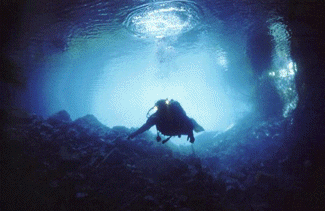For thousands of years, the Greek civilization developed with people living in communities and creating settlements with town square centers of commerce, streets, and mud-brick houses. With each period from the Bronze age to the Neolithic age, the Cyclades, Minoan, Mycenean, Archaic, and Classical ages, there evolved a civilization and a structure, a democracy that is the basis of modern western governments.
The Olympic games, fundamental science, and philosophy were the offspring of a culture that was born out of its democracy and developing commerce. Trade with foreign territories and wars among the nearby territories, gave rise to a maritime capability that brought greater power to the Greeks. Today, we are the beneficiaries of this heritage and specifically for those of whose passion is the sea, have a rich underwater history to discover and explore.
Present day Greece is comprised of the mainland and some 1,300 islands, approximately 250 of which are inhabited. Until recently, scuba diving in Greece and her islands were seriously limited in order to protect underwater treasures form being disturbed. Diving was restricted to only certain specific locations with the remaining territorial waters placed off limits. Since 2008 these restriction have been lifted and modified such that only certain specific sites are not accessible to divers, but the rest of the underwater areas are opened. This places a great responsibility on those of us whose passion is diving and also the protection of marine life and historical treasures.
My scuba diving originates back to the 70’s with most dives on the many wrecks off the New Jersey and New York coasts. It was exciting to dive on these wrecks, even though most times visibility was 10 to 15 ft and on a rare day, we got 20 ft visibility. Later, I discovered clear water diving in the Caribbean and down to Tobago. That was quite a contrast. Visibility of 100 + ft and a wide variety of marine life.
Now most of my diving is in Greece. Normal visibility is 100 ft, with an abundance of wrecks (recent and very old). There is also a variety of diving that suits my friends’ fantasies like walls, reefs, caves and marine life. I am thrilled by the dive sites there but still prefer to dive on wrecks. And after all is said and done, the after dive life on any Greek island caps the end of a beautiful day.
Some of the islands I have dove of the islands of Aigina, Macronisos, coast off Lavrio and Sounion, Kea, Kythnos, Paros, Anti-Paros, Mykonos, Santorini, Naxos, Sifnos … and many more
On a recent dive off Sifnos, I dove with a few friends who operate a dive center there and explored a wreck at a depth of just 40 ft depth. This particular wreck was a small, very old merchant ship. The wooden hull was totally gone but the cargo, a unique collection of earthenware were found in a pattern of the ship’s hull and protruded from the seabed that partially encrusted them.
On another dive off the coastal island of Macronisos, we dove on a wreck, the Portugal, that hit the reef and broke into two pieces. One piece of the wreck lays on the side of the reef, and the other lays at a depth of 75 to 100 ft depth.
Just to cover other interests ( besides wrecks) an ancient cavern was discovered 10 years ago near the island of Paros. We entered the cave from different points. One, the largest is at a depth of 15 to 40 ft and an entrance diameter of about 30 ft. Another of its entrances is a depth of 25 ft and an entrance diameter of 8 ft. Light that enters the cave created a brilliant light show. There were soft and hard corals in all kinds of shapes and forms. Inside the cave, when we surfaced, we found huge, multi shaped stalactites hanging from the cave’s ceiling. Depth of the cave is about 60 ft.
Marine life is a collection of Shrimp, eels, seahorses, dolphins, sea turtles, Octopus, nudibranchs, crabs and much more. Many are best found when the sun goes down which is why I highly recommend a night dive.
Something to be aware of. On just about any dive in the Greek islands, there is a good chance that you will encounter some ancient artifacts which is what gets me excited about diving there. It’s like entering a world that has been waiting for me to visit. BUT and a very big BUT, anytime we encounter what appears t be an archeological treasure, we are obliged, both as stewards of the sea, and by law, to report the discovery to protect the heritage of the Greek culture. We look, photograph, but NO TOUCH. You can imagine that with thousands of years of mariner history and the spectacular sea battles throughout history or the massive sinking of vessels during severe weather, thee are untold numbers of underwater treasures waiting to be found.







